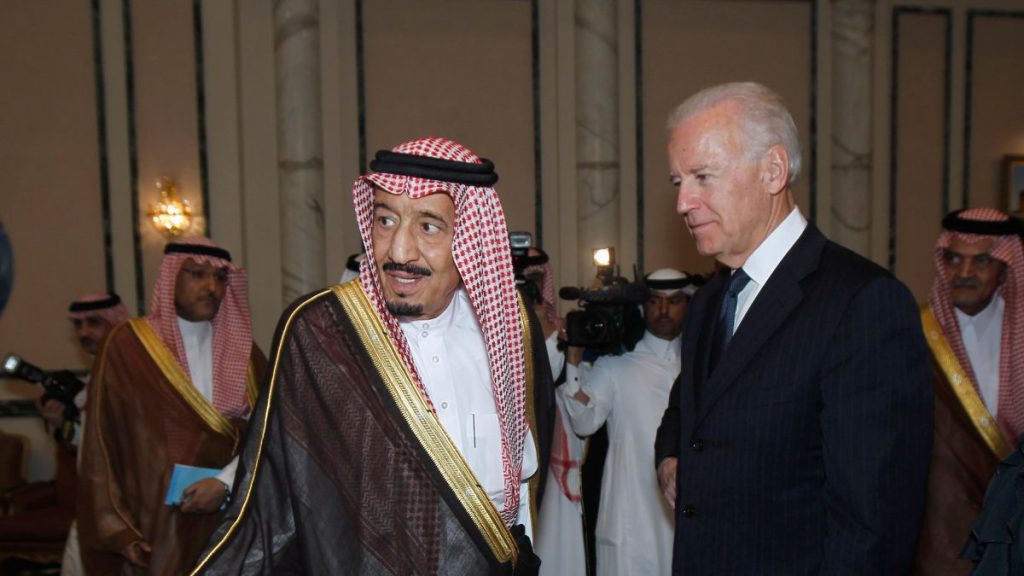Will $100 oil force Biden to call the Saudi crown prince?

Biden Biden’s issue with the crown prince is personal, said Abdulaziz Sager, chairman of the Saudi-based Gulf Research Center. “If you have something that you wanted to deliver to Saudi, as a message, or to the crown prince, say it loud and clear. Say this is what you want,” he said. “It’s only logical” for the US to change its approach to Saudi Arabia with oil at $100, he added. But even if Saudi Arabia agrees to raise output, will that relieve pressure on oil prices? Not necessarily, said Ellen Ward, senior non-resident fellow at Washington’s Atlantic Council. “The [OPEC] oil ministers have indicated that they are skeptical about the ability to set prices precisely simply by increasing production,” she said. “In other words, the causes of the recent rise in oil prices are due more to financial speculation and geopolitical risk than a lack of supply.” And even if Biden makes that much anticipated call to the crown prince, “there is no indication that Mohammed bin Salman would capitulate because of a personal request,” she added. If the Russia-Ukraine crisis drives oil to about $110 a barrel, US inflation would exceed 10% on a year-over-year basis, according to consulting firm RSM. That hasn’t happened in the US since 1981 and would cause a “real short-term shock,” it said. The predicament Biden faces won’t go unnoticed in Tehran, possibly strengthening its hand at the Vienna negotiations. On Wednesday, it recalled its top negotiator for consultations and called on the West to be “realistic” about talks. S&P Global Platts expects that an interim nuclear deal could allow Iranian exports to grow by 500,000 barrels per day (bpd) in April and May, while a comprehensive agreement could allow 1.5 million bpd of export growth within nine months. Iran pumped 3.83 million bpd before Trump’s pullout from the nuclear pact in 2018. “Every US president used to lobby Saudi Arabia to increase production,” and the kingdom often obliged, said Yousef Alshammari, senior research fellow at London’s Imperial College. “During the past four years we saw Saudi Arabia either raising production or making voluntary cuts during the Trump era. But now the kingdom is sticking to a more standard approach.” The more Biden “personalizes” his dispute with Saudi Arabia, the more it will force the kingdom to seek strategic alternatives to the US, Sager said. “I don’t think that Saudi Arabia is going to allow the situation between the US and Russia to jeopardize its relationship with Russia,” said Ward. “The energy relationship between Saudi Arabia and Russia exists outside of the geopolitical issues between Russia and Ukraine and as long as Saudi Arabia can remain above the situation without having to choose sides, it will likely refrain from even commenting on Russia’s actions in eastern Ukraine.” Other top Middle East news UAE to buy Chinese fighter jets as it ‘diversifies military capabilities’ The UAE said on Tuesday it will order 12 L-15 planes from China, with the option of ordering 36 more, as it continues to “diversify and modernize” its military capabilities. Background: In December, the UAE suspended a multi-billion-dollar deal to buy US-made F-35 fighter jets. That month, it also placed a $19 billion order for 80 French Rafale fighter jets and 12 military helicopters. Why it matters: The decision is a sign of Abu Dhabi’s growing frustration with Washington’s attempts to limit Chinese technology sales to the Gulf state. The UAE has been skeptical about US claims of potential security breaches and has expressed anxiety about getting caught up in a “new cold war” between a top trading partner and its main strategic ally. Iraq’s requirement to pay victims of 1990 Kuwait invasion ends after three decades The UN Security Council voted unanimously on Tuesday to end a three-decade-long requirement for Iraq to compensate people in Kuwait affected by Saddam Hussein’s invasion in 1990. Background: More than $50 billion was paid out by Iraq through a fund set up by the UN to cover losses and damages suffered as a direct result of the 1990-1991 Gulf War. The last chunk of payment was submitted last week. Why it matters: Since the overthrow of Hussein in 2003, Iraq has worked to shift its regional policy to repair ties with former adversaries. The end of reparations to Kuwait marks a symbolic end from the foreign policy of the Hussein era. Qatar says replacing Russian gas to Europe quickly is ‘almost impossible’ Qatar’s Energy Minister Saad Sherida al-Kaabi said that 10% to 15% of the country’s long-term gas exports are divertible away from existing customers, as Western nations continue talks over a Russian gas substitute to Europe following the invasion of Ukraine. Background: Qatar and other countries such as Japan have recently been approached by the US to reroute gas supplies to Europe in case conflict between Russia and Ukraine escalates. Why it matters: A large proportion of Europe’s gas supplies come from Russia. Kaabi’s comments renewed concerns over Europe’s security of gas supplies as the US and its allies race to draw up contingency plans. Around the regionSaudi Arabia for the first time commemorated its nearly 300-year-old founding on Tuesday, choosing a date that highlights the establishment of the first Saudi state by Mohammed bin Saud in 1727. The holiday, to be commemorated every February 22, is a slight break from the ultra-conservative Wahhabi school of Islam that attributes the foundation of the Saudi state to the alliance forged between bin Saud and the Islamic preacher Mohammed ibn Abd al-Wahhab.






